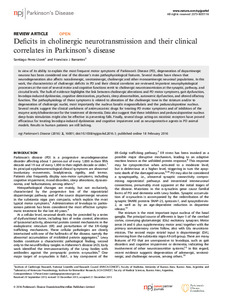Please use this identifier to cite or link to this item:
https://repositorio.uca.edu.ar/handle/123456789/8688| Título: | Deficits in cholinergic neurotransmission and their clinical correlates in Parkinson’s disease | Autor: | Pérez Lloret, Santiago Barrantes, Francisco José |
Palabras clave: | MEDICINA; ENFERMEDAD DE PARKINSON; ENFERMEDADES NEUROGENERATIVAS | Fecha de publicación: | 2016 | Editorial: | Parkinson's Disease Foundation Macmillan Publishers Limited |
Cita: | Pérez Lloret S, Barrantes FJ. Deficits in cholinergic neurotransmission and their clinical correlates in Parkinson's disease. npj Parkinson's Disease 2,16001; doi: 10.1038/npjparkd.2016.1 (2016). Disponible en: https://repositorio.uca.edu.ar/handle/123456789/8688 | Resumen: | Abstract: In view of its ability to explain the most frequent motor symptoms of Parkinson’s Disease (PD), degeneration of dopaminergic neurons has been considered one of the disease’s main pathophysiological features. Several studies have shown that neurodegeneration also affects noradrenergic, serotoninergic, cholinergic and other monoaminergic neuronal populations. In this work, the characteristics of cholinergic deficits in PD and their clinical correlates are reviewed. Important neurophysiological processes at the root of several motor and cognitive functions remit to cholinergic neurotransmission at the synaptic, pathway, and circuital levels. The bulk of evidence highlights the link between cholinergic alterations and PD motor symptoms, gait dysfunction, levodopa-induced dyskinesias, cognitive deterioration, psychosis, sleep abnormalities, autonomic dysfunction, and altered olfactory function. The pathophysiology of these symptoms is related to alteration of the cholinergic tone in the striatum and/or to degeneration of cholinergic nuclei, most importantly the nucleus basalis magnocellularis and the pedunculopontine nucleus. Several results suggest the clinical usefulness of antimuscarinic drugs for treating PD motor symptoms and of inhibitors of the enzyme acetylcholinesterase for the treatment of dementia. Data also suggest that these inhibitors and pedunculopontine nucleus deep-brain stimulation might also be effective in preventing falls. Finally, several drugs acting on nicotinic receptors have proved efficacious for treating levodopa-induced dyskinesias and cognitive impairment and as neuroprotective agents in PD animal models. Results in human patients are still lacking. | URI: | https://repositorio.uca.edu.ar/handle/123456789/8688 | ISSN: | 2373-8057 (online) | Disciplina: | MEDICINA | DOI: | 10.1038/npjparkd.2016.1 | Derechos: | Acceso abierto | Fuente: | npj Parkinson's Disease N° 2, 2016 |
| Appears in Collections: | Artículos |
Files in This Item:
| File | Description | Size | Format | |
|---|---|---|---|---|
| deficits-cholinergic-neurotransmission.pdf | 867,22 kB | Adobe PDF |  View/Open |
Page view(s)
331
checked on Jan 21, 2026
Download(s)
257
checked on Jan 21, 2026
Google ScholarTM
Check
Altmetric
Altmetric
This item is licensed under a Creative Commons License

